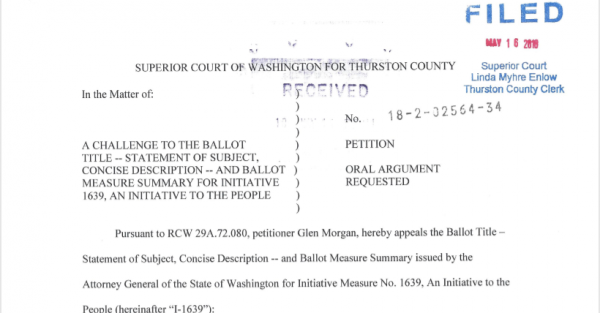
At least three different challenges have been filed against the Ballot Title of anti-gun Initiative 1639 in Washington State, including one that alleges the measure “proposes a variety of new and unprecedented restrictions on firearm ownership,” including failure to inform voters that it creates a new hidden tax on guns, and creates “new felony-level crimes based on firearm storage violations.”
Challenges were filed Wednesday by two private citizens and the Pacifica Law Group. There may be some organized opposition to I-1639 coming. The Seattle P-I.com’s veteran columnist Joel Connelly last week openly wondered whether the National Rifle Association would get deeply involved.
One of those citizens, Glen Morgan, provided Liberty Park Press with a copy of his complaint. It is an interesting read. It takes issue with the initiative’s prohibition on the purchase of firearms by 18-21 year old residents, calling it “a radical change in Washington State firearm laws.”
Alan Gottlieb, chairman of the Bellevue-based Citizens Committee for the Right to Keep and Bear Arms, and founder of the Second Amendment Foundation, said Thursday morning both groups are supporting Morgan’s ballot title challenge.
“The initiative intent language,” Morgan says in his challenge, “presents a dangerous argument that 18-21 year old citizens of Washington State shouldn’t be allowed to own firearms because, ‘…the brain does not fully mature until a later age.’ This argument can be made to deny the right to vote at these ages as well. This is still considered the typical age Washingtonian citizens are accepted into military service and provided with control over weaponry with destructive potential far in excess of any firearms possessed by non-military citizens in Washington State. This is a major legal and practical impact on the rights of a whole class of citizens in Washington State who will lose their historic and Constitutionally guaranteed rights of firearm ownership. It should be reflected as such in the Statement of Subject due to the significance of this radical change to existing law.”
Attached as an exhibit to the Morgan complaint is a story from Northwest Public Broadcasting that shows Washington Attorney General Bob Ferguson endorsed I-1639, noting that the liberal Democrat was “breaking with tradition.”
“The Democrat told public radio exclusively…that he backs the proposed initiative from the Alliance for Gun Responsibility that would raise the purchase age for semi-automatic rifles to 21 and require enhanced background checks—among other provisions,” the story said.
Morgan notes in his challenge, “The Attorney General’s Concise Description is not a true and impartial description of the measure’s essential content because it uses the term ‘enhanced’ before background checks when in-fact there is no such thing as an ‘enhanced’ background check.”
The term “enhanced background check” has actually become part of the gun prohibition lobby’s lexicon over the past couple of years, without a clear definition of what that might entail. But Morgan does that in his complaint.
“The initiative,” he explains, “simply is requiring the local law enforcement check the same databases as the National Instant Criminal Background Check System (NICS) which is a United States system for determining if prospective firearms or explosives buyers’ name and birth year match those of a person who is not eligible to buy. There is nothing ‘enhanced’ by this requirement in the initiative, and this is once-again a poll-tested term of art that refers to nothing new with the current background system.”
Alluding to Ferguson’s endorsement of the anti-gun initiative, Morgan asserts, “The Attorney General’s office has created a substantial reasonable suspicion in the eyes of the general public that the language used in this Concise Description has been drafted for maximum bias and support of the sponsors of the initiative by his unprecedented and very public statement of support for this initiative.”
With this and two other challenges facing the initiative, the courts in Thurston County – where the complaints have been filed – will have to work fast. Meanwhile, in an email fund raiser circulated Wednesday, the gun control Alliance said it must collect more than 259,000 signatures before July to get its measure on the fall ballot. It has “set a $75,000 launch goal” – which amounts to pocket change for wealthy elitists who bankroll the organization – “and we’re pulling out all the stops to get there.”
The Alliance pushed through Initiative 594 in 2014, the so-called “universal background check” measure that was supposed to prevent guns falling into the wrong hands, and thus prevent violent crimes including mass shootings.
But that initiative has hardly lived up to its advertising, say Second Amendment activists. For example, a 19-year-old who passed a background check killed three teens at a party in Mukilteo in 2016. A few months later, another teen took a rifle from his step-father’s home and killed five people at the Cascade Mall in Burlington, so there was no background check.
And the Seattle P-I.com is reporting about the teen who is now charged with killing four people on different occasions because “he’d recently acquired a new .22 caliber handgun and ‘wanted to see the effects of shooting someone with it,’ court documents say,” the online newspaper reported.
At age 17, the suspect, Justice Harrison, could not have legally purchased a handgun in Washington or any other state. However he “acquired” that pistol, it was an illegal transaction that was not prevented by I-594.
